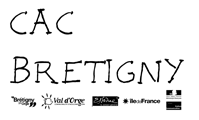Cornelius Cardew
and the Freedom of Listening
5 April – 27 June 2009
Espace Jules Verne, Rue Henri Douard
91220 Brétigny s Orge – France
tel 33 01 60 85 20 76
info [at] cacbretigny.com
Concerts and performances 5 April, 16 and 17 May, 7 June and 22 June 2009 with:
Nina Canal, Rhys Chatham, Luke Fowler, Michel Guillet, Nadia Lichtig, Michael Morley, Michael Parsons, Keith Rowe, Marcus Schmickler, Sara Stephenson, Samon Takahashi, Terre Thaemlitz, John Tilbury, Peter Todd, Annie Vigier and Franck Apertet
The Centre d’Art Contemporain de Brétigny is pleased to announce an exhibition and program of events that retrace the artistic career of the English composer Cornelius Cardew. The CAC Brétigny and the curators will present an exhibition of archives, which breaks with a traditional museum approach, and a series of concerts and performances that testify to the vibrancy of Cardew’s work and his influence on contemporary artistic and musical practice.
Pierre Bal-Blanc
CAC Brétigny
The English composer Cornelius Cardew (1936-1981) is undoubtedly one of the major composers to have emerged in the second half of the twentieth century. Although he has not yet received widespread public recognition, as have the two composers, Karlheinz Stockhausen and John Cage, who initially influenced his direction as a composer, Cardew inspired a generation of British avant-garde composers and musicians. Such internationally recognized composers as Gavin Bryars, Brian Eno, Michael Nyman, and Frederic Rzewski have all claimed Cardew as an important influence on their own musical development. Moreover, Cardew’s radical approach to composition and his political reflection on the status of music making led him, in the late sixties,to instigate one of the most important attempts to establish the democratic claims of avant-garde culture. The Scratch Orchestra, which grew out of classes Cardew taught at Morley College in 1968, radically questioned the social limitations of art and music making as realms of specialized knowledge and experience. Combining both musicians and non-musicians, the Scratch Orchestra not only transgressed the traditional boundaries and hierarchy separating the composer, performer, and listener, but also the boundaries dividing the realm of art into separate fields; visual and performance art were equally a part of the collective and creative experience that inspired the members of the Scratch Orchestra throughout its four-year existence. Since 2006, the seventieth anniversary of his birth, a renewed interest in Cardew’s work as a composer and political figure has developed. An anthology of Cardew’s writings, Cornelius Cardew (1936-1981): A Reader and an exhibition, Lonely at the Top: Sound Effects #3, at the MukHA in Antwerp, were followed by the publication of a major biography, Cornelius Cardew (1936-1981): A Life Unfinished, written by pianist John Tilbury. In light of this interest, and given that Cardew’s work is little known outside a specialized audience in France, the CAC Brétigny will present an exhibition that traces Cardew’s career from the seminal graphic score to the history of the Scratch Orchestra and its dissolution in 1975, when Cardew renounced his work as an avant-garde composer and, until his death in 1981, devoted his energy to politics. In conjunction with the exhibition, the CAC will present a series of performances of works spanning Cardew’s career, along with a number of compositions by former members of the Scratch Orchestra. In a historical moment when it is all to easy to sentimentalize “over the good old days of experiment and action,” as one recent review of Cardew’s writings has suggested, the exhibition will not only attempt to retrace the history of one of the most influential post-war twentieth century composers and the important, yet still little known, avant-garde group he inspired, but also show why Cardew’s example is needed “to shake us out of our current complacency and despair.”
Dean Inkster


